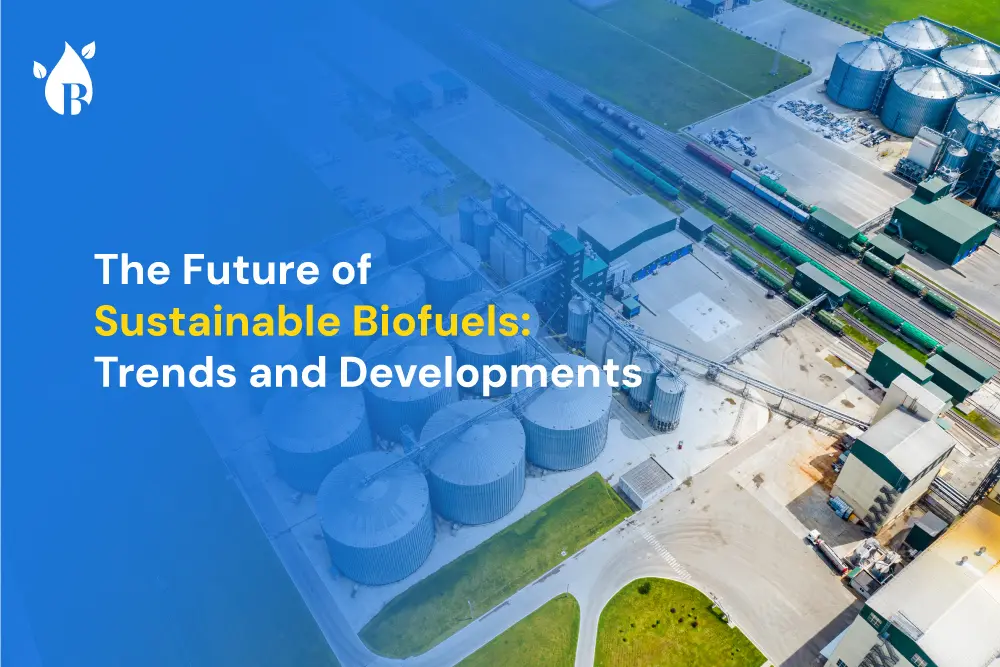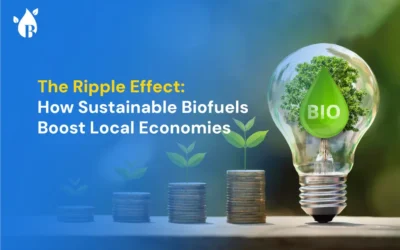
Is there really a conflict between biofuels and our food supply, or is it just a perception? Let’s discover the facts, explore the real benefits of biofuels, and look at their current trends and future developments.
Biofuels are in higher demand than ever before. The International Energy Agency forecasts a 28% growth, equivalent to 41 billion liters, in global biofuel demand from 2021 to 2026. However, doubts persist about this ongoing demand. While there’s a crucial need to cut emissions in transport and industry, concerns linger about the impact on the food supply chain. Is this skepticism justified, or is it a matter of perception? Let’s understand the true value chain of biofuels, its trends existing now and development one can expect in the future.
Geopolitical Factors and Energy Independence
The invasion of Russia into Ukraine has raised uncertainty in the global supply chain, especially oil supply. This has highlighted the need to be energy independent on fossil fuel import dependence for countries, such as India, who have growing population and economic presence, has become imperative.
Advantageously, India has loads of biomass residues, thanks to its agricultural-based economy. And, biofuels produced from domestically sourced agricultural and waste residues can definitely be an attractive alternative to focus on.
Biofuels Shields Price Volatility
In India, the use of biofuels is currently 10%–20% cheaper than the fossil fuels they replace. This cost advantage shields biofuels from the ups and downs of global fossil fuel prices. What’s more, since biofuels are made entirely in India, they’re not affected by foreign exchange rate fluctuations, unlike imported fossil fuels. This translates to more stable and predictable costs for consumers when buying petrol and coal products. Beyond cost benefits, biofuels are also considered a practical alternative for countries aiming for net-zero emissions. They produce fewer harmful greenhouse gases compared to traditional fossil fuels when burned, making biofuels a win-win solution for both cost savings and environmental goals.
“Biofuel is currently 10%–20% cheaper than the fossil fuels they replace”
A Closer Look at the Current Biofuel Trends
Bioethanol and biodiesel, both part of the first generation of biofuel technology, are the most prevalent biofuels. Bioethanol is primarily derived from corn, sugarcane, or wheat, while biodiesel is processed from rapeseed, soybean oil, used cooking oil (UCO), and palm oil. The idea of commercial biofuels gained traction during the 1970s oil crisis, driven by concerns about energy security.
Brazil took the lead in scaling up bioethanol production, making it mandatory to blend with petrol in 1976 and initiating large-scale processing from sugarcane. Today, Brazil remains a major player, contributing around 30% of the world’s biofuel production.
Interestingly, Asia is projected to outpace the entire European biofuel production before 2026, driven by robust domestic policies, increasing demand for liquid fuels, and export-oriented production, according to the IEA. Asian nations contribute almost a third of the new production expected in this period. The substantial growth is primarily attributed to blending targets for biodiesel in Indonesia and Malaysia, along with India’s ethanol policies.
As more countries recognized the economic and environmental benefits of biofuels, government mandates became a common tool. This intervention significantly increased demand, with mandates in several countries playing a crucial role in a five-fold rise in global biofuel consumption today.
Getting Into Right Strategies
The current regulatory framework is ushering in a promising era for biofuels. Notably, current government initiatives like the 10% co-firing mandate for coal replacements create a conducive environment for biofuel utilization in energy generation. India’s commitment to biofuel adoption is further evident in targets like E20 (20% ethanol) and B10 (10% biodiesel) in the transport sector.
In the past few years, regulatory policies mandating biofuel substitution for fossil fuels across industries have significantly boosted demand5tr4e3e43e and adoption. Despite this progress, effective education and awareness campaigns are pivotal to showcase the true benefits of biofuels.
Looking ahead, increasing demand is poised to divert more waste materials to the biofuel value chain. Technological advancements will further enhance the efficiency of converting waste into biofuels, expanding the range of feedstock options and bolstering the industry’s overall viability. To drive widespread acceptance among petrol consumers, transparent retailing of biodiesel, bioethanol, and bio-CNG is recommended. This transparency will build confidence and facilitate broader biofuel adoption.
Additionally, enforcing strict emission regulations for major fuel-consuming industries and establishing a robust carbon credit market in India will be crucial. Holding industries accountable for emissions and offering incentives through carbon credits will promote biofuel usage. Implementing effective monitoring and enforcement mechanisms for emission standards will level the playing field and accelerate India’s transition to a low-carbon economy.
Buyofuel for the Biofuel Future
Buyofuel is an online platform designed to streamline the biofuel supply chain. They connect fuel consumers with verified biofuel manufacturers and assist manufacturers in sourcing organic wastes directly from waste generators. Our user-friendly platform, accessible from mobile or PC, leverages technology to digitize B2B transactions in biofuel and waste trading.
In the next 3–5 years, the organization aims to facilitate the transaction of at least 13 million tonnes of biofuels and waste, resulting in a significant reduction of up to 10 million tonnes of CO2 emissions. This initiative seeks to establish biofuels as a mainstream, renewable fuel option, contributing to the decarbonization of industries in India and beyond. Recognizing that the industrial sector is a major contributor to India’s CO2 emissions, Buyofuel envisions biofuel playing a pivotal role in decarbonizing Indian industries and supporting the country in achieving its net-zero goals.



